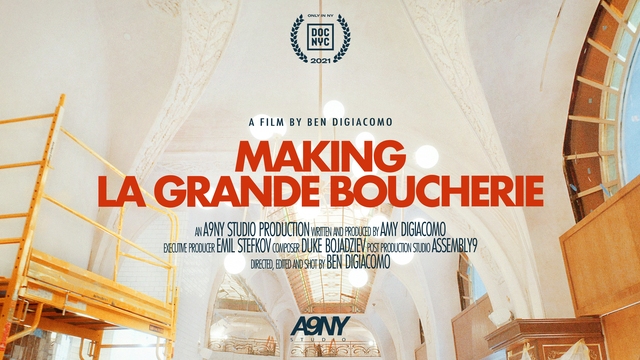The Producers

Ben DiGiacomo- Director, Cinematographer, Editor
Ben is a former Parisian and forever New Yorker whose passion for documentary filmmaking stems from a deep desire to visually explore complex identities within the constructs of nationality and culture. His lived experience as an immigrant to the United States has compelled his interest in the commonalities between all immigrant stories, as well as the more overlooked parts which are often present in the themes across his work.
His first feature length documentary BAD LIKE BROOKLYN DANCEHALL (Tribeca 2023) is the first recipient of The Gotham Documentary Award from the Decentralized Pictures Foundation, co-founded by Roman Coppola, Leo Matchett, and Mike Musante. The project was awarded the Hyphen Grant for highlighting the cultural richness, complexity and quirks of the Caribbean-American experience. He is a 2023 Fellow of The Better Angels Society Lavine Fellowship, a component of The Library of Congress Lavine/Ken Burns Prize for Film, for recognition in documenting America’s diverse stories.
Ben’s early career has been defined by his quality work in commercial post-production and trust garnered from the leading advertising agencies. He founded the post-production studio ASSEMBLY9 in 2012, and established its premium nonfiction production arm A9NY Studio in 2018.

Amy DiGiacomo - Producer
Amy is a producer, writer and co-founder of A9NY Studio where she develops premium nonfiction films. She earned her chops as a field researcher in Kosovo where she co-authored 1325 Facts and Fables, a published collection of stories about the landmark resolution on Women, Peace and Security. Later, after establishing her film career producing national commercial campaigns from leading agencies in the beauty
and fashion space, she applied her learned skills to independent filmmaking and is now happily documenting the stories that captivate and delight her.
Making The Film
Directors' Statement
My ambition with this film has been to draw attention to the beauty of artisan craftsmanship in a society that values speed and low price points. The fact that the custom work of generational family-owned businesses in France would be so prominently displayed at La Grande Boucherie in Midtown Manhattan really drew me to this story and made me realize the potential for how meaningful this type of “stage” could be to artisans dedicated to their craft. I see the documentary as another way to share their work and support the revival of what some consider a dwindling trade. My own grandfather was a woodworker so I already possess a deep appreciation for all work done by hand, and having grown up in Paris myself where this type of work is
highly regarded culturally, I wanted to be a part of sharing what this would look like in the United States, which in comparison tends to prioritize quick, often mass produced or wholesale interiors in the restaurant industry.
Another ambition, that came into existence following the unexpected global pandemic, is to uplift the restaurant industry in the toughest city in the world to make it under normal conditions, during one of the most challenging times in recent history. Though the pandemic was an unpredictable part of the initial storyline, I realized it represents the biggest challenge ever faced by an already difficult industry, and therefore being present to capture the events of 2020 from the unique point of view of a restaurant that had begun construction before the pandemic is a historical time-capsule of our generation.
Artistically I wanted to achieve a distinct and rare behind-the-scenes look at the effort and artistry that is often an overlooked part of a dining experience. When people think of restaurants they think of the food, naturally, but I believe it is the intentionality of the atmosphere and the ambiance that you are transported to that makes the experience whole. I want to share the feeling of optimism defined by the period that inspired the design of the restaurant, the belle epoque. My hope is for that feeling to transmit to the audience while also celebrating the artisan professions that helped to define the space.
 The ambitious architectural transformation of a forgotten Manhattan corridor into a larger-than-life 1920s-inspired brasserie that honours timeless French design through the multigenerational artisans who will handcraft everything from the iron railings to the pewter countertops using traditional 100-year-old methods. Construction crews push the limits to rapidly complete the project during what would come to be known as the hardest time in history for the restaurant industry.
The ambitious architectural transformation of a forgotten Manhattan corridor into a larger-than-life 1920s-inspired brasserie that honours timeless French design through the multigenerational artisans who will handcraft everything from the iron railings to the pewter countertops using traditional 100-year-old methods. Construction crews push the limits to rapidly complete the project during what would come to be known as the hardest time in history for the restaurant industry.








